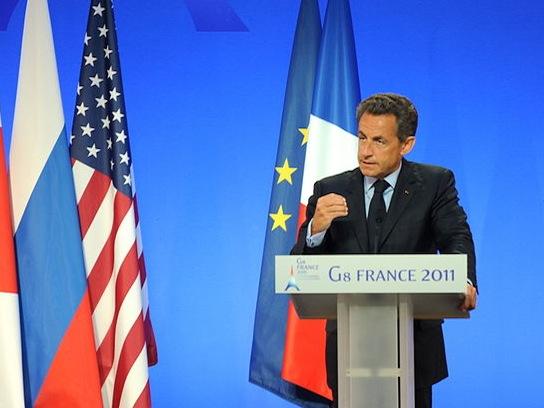Pride and profit: France’s interest in Libya’s war
Photo of French president Nicolas Sarkozy (Image by Wikimedia user Guillaume Paumier)
Story from PRI’s The World. Listen to audio above for full report.
French war planes were the first to take to the skies in NATO’s campaign against Gaddafi. At the Paris conference on Libya on Thursday, French President Nicolas Sarkozy said the sorties weren’t over.
“We’ve agreed to continue the NATO strikes until Colonel Gaddafi and his supporters are no longer a threat to Libya,” he said.
Once that threat is removed, he added, Libyans would have to work hard to avoid internal conflict. Sarkozy said conference participants had asked Libya’s National Transitional Council to begin “a process of reconciliation and forgiveness, so that the mistakes that have been made in other countries might serve as a guiding light.”
That may have been a reference to Iraq, where after U.S. led forces toppled Saddam Hussein, members of his ruling Baath party were barred from the army and public service. That exclusion helped stoke sectarian violence that continues today.
So far the Obama administration appears happy to let France lead on Libya, said Harvard professor and former U.S. diplomat Nicolas Burns. He cited the proximity of France and Spain and Italy to Libya, and what he called the much greater interest that Europe has compared to the U.S.
“The United States has led in any number of countries, economic assistance over the last year or so,” he said. “I think this is one opportunity for Europe to continue to lead that’s good and healthy for the transatlantic relationship.”
France gambled with its early intervention in Libya. But since the rebels ousted Gadhafi’s forces from Tripoli, Sarkozy has been basking in the limelight, as have his supporters. They include French philosopher and pundit Bernard Henry Levy.
“For France,” Levy said, “it is the first war waged and won since 1918. And for Europe and France and England especially, it is the first one where we go to help free people going to democracy. So it’s a great and huge victory.”
A victory that Sarkozy no doubt hopes will give him a boost in the polls. France holds presidential elections in eight months, and Sarkozy is trailing a number of potential Socialist contenders. But French pollster Marc-Andre Allard said Sarkozy shouldn’t expect too much of a boost from his overseas adventures, even successful ones.
“It’s very likely that in eight months time voters will mainly vote on domestic issues,” he said. “However if the National Transitional council succeeds in establishing democracy of course this will be a political benefit for Mr. Sarkozy.”
And, possibly, an economic benefit, for France. This week rumors have circulated that Libyan rebels promised France a third of its oil business in exchange for its support.
Presidential spokesman Eric Besson denied this Friday on French radio. He said, “I’ll repeat what the heads of Libya’s national transitional council and the French oil company Total have said: there is no specific deal on the table.”
But Total was one of the two main players in Libya’s oil fields, along with Italy’s ENI, before the uprising. No one should be surprised, Besson added, if Total goes on to take a big slice of that pie again.
Read the rest of this story on The World website.
—————————————————————–
PRI’s “The World” is a one-hour, weekday radio news magazine offering a mix of news, features, interviews, and music from around the globe. “The World” is a co-production of the BBC World Service, PRI and WGBH Boston. More about The World.
The article you just read is free because dedicated readers and listeners like you chose to support our nonprofit newsroom. Our team works tirelessly to ensure you hear the latest in international, human-centered reporting every weekday. But our work would not be possible without you. We need your help.
Make a gift today to help us raise $67,000 by the end of the year and keep The World going strong. Every gift will get us one step closer to our goal!
